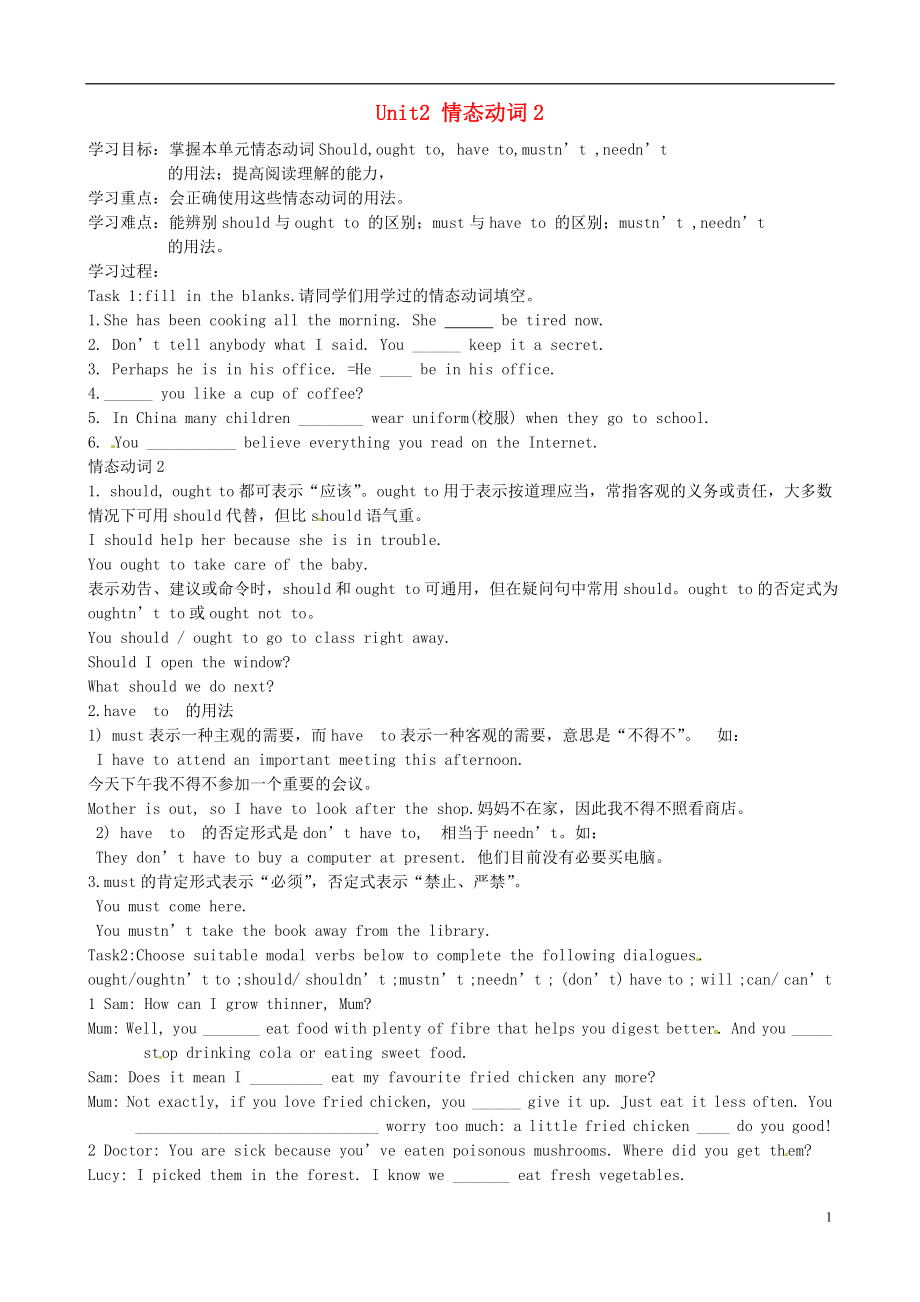《河北省沙河市二十冶綜合學(xué)校高中分校高中英語 Unit2 Olympic Games grammar導(dǎo)學(xué)案 新人教版必修2》由會(huì)員分享�����,可在線閱讀,更多相關(guān)《河北省沙河市二十冶綜合學(xué)校高中分校高中英語 Unit2 Olympic Games grammar導(dǎo)學(xué)案 新人教版必修2(2頁珍藏版)》請(qǐng)?jiān)谘b配圖網(wǎng)上搜索���。
1��、
Unit2 情態(tài)動(dòng)詞2
學(xué)習(xí)目標(biāo):掌握本單元情態(tài)動(dòng)詞Should,ought to, have to,mustn’t ,needn’t
的用法��;提高閱讀理解的能力����,
學(xué)習(xí)重點(diǎn):會(huì)正確使用這些情態(tài)動(dòng)詞的用法�。
學(xué)習(xí)難點(diǎn):能辨別should與ought to 的區(qū)別;must與have to 的區(qū)別���;mustn’t ,needn’t
的用法��。
學(xué)習(xí)過程:
Task 1:fill in the blanks.請(qǐng)同學(xué)們用學(xué)過的情態(tài)動(dòng)詞填空�����。
1.She has been cooking all the morning. She be tired now.
2. Do
2���、n’t tell anybody what I said. You ______ keep it a secret.
3. Perhaps he is in his office. =He ____ be in his office.
4.______ you like a cup of coffee?
5. In China many children ________ wear uniform(校服) when they go to school.
6. You ___________ believe everything you read on the Internet.
情
3、態(tài)動(dòng)詞2
1. should, ought to都可表示“應(yīng)該”����。ought to用于表示按道理應(yīng)當(dāng)���,常指客觀的義務(wù)或責(zé)任,大多數(shù)情況下可用should代替����,但比should語氣重。
I should help her because she is in trouble.
You ought to take care of the baby.
表示勸告���、建議或命令時(shí)����,should和ought to可通用��,但在疑問句中常用should���。ought to的否定式為oughtn’t to或ought not to���。
You should / ought to go to class rig
4、ht away.
Should I open the window?
What should we do next?
2.have?to?的用法
1) must表示一種主觀的需要�,而have?to表示一種客觀的需要��,意思是“不得不”。?如:?
I have to attend an important meeting this afternoon.
今天下午我不得不參加一個(gè)重要的會(huì)議���。
Mother is out, so I have to look after the shop.媽媽不在家�����,因此我不得不照看商店��。?
2) have?to?的否定形式是don’t ha
5��、ve to, 相當(dāng)于needn’t�。如:
They don’t have to buy a computer at present. 他們目前沒有必要買電腦�。
3.must的肯定形式表示“必須”,否定式表示“禁止�、嚴(yán)禁”。
You must come here.
You mustn’t take the book away from the library.
Task2:Choose suitable modal verbs below to complete the following dialogues.
ought/oughtn’t to ;should/
6��、 shouldn’t ;mustn’t ;needn’t ; (don’t) have to ; will ;can/ can’t
1 Sam: How can I grow thinner, Mum?
Mum: Well, you _______ eat food with plenty of fibre that helps you digest better. And you _____ stop drinking cola or eating sweet food.
Sam: Does it mean I _________ eat my favourite fried chic
7��、ken any more?
Mum: Not exactly, if you love fried chicken, you ______ give it up. Just eat it less often. You ______________________________ worry too much: a little fried chicken ____ do you good!
2 Doctor: You are sick because you’ve eaten poisonous mushrooms. Where did you get them?
Lucy: I p
8���、icked them in the forest. I know we _______ eat fresh vegetables.
Doctor: Oh, but you _______ eat them until you’re sure they are not poisonous.
Lucy: Thank you, doctor. I’ll be more careful next time.
3 Charles: I wish I could see things clearly in the dark.
Tom: Eating carrots _______ help y
9�、ou see better. You _______ eat some every day.
Task 3:用所給的情態(tài)動(dòng)詞填空��。
must; oughtn’t to; don’t have to; couldn’t;mustn’t; needn’t; can’t; have to
1. You _______________________ go on working because you look so tired now.
2. The weather turned out to be fine yesterday. I _______ have had the troubl
10、e to carry my umbrella with me.
3. If you earn more than £5,000, you _______ pay tax.
4. You _______ play now!You shall finish your homework first!
5. I know things are hard with you, but you _____________ try to get over the difficulties.
6. I didn’t see her at the meeting this morning; she
11����、_____________ have spoken at the meeting.
Task 4:單選
1. I thought you __ like something to read, so I have brought you some books.
A. may B. might C. would D. must
2. Where is my pen? I ____ it.
A. might lose B. would have lost C. should have lost D. must have lost
12、
3. I didn’t hear the phone. I __ asleep.
A. must be B. must have been C. should be D. should have been
4. --Is John coming by train?
--He should, but he __ not. He likes driving his car. (2002高考題)
A. must B. can C. need D. may
5. --I heard they went skiing
13����、 in the mountains last winter.
--It ____ true because there was little snow there. (2002北京高考題)
A. may not be B. won’t be C. couldn’t be D. mustn’t be
6. ---There were already five people in the car, but they managed to take me as well.
---It ___ a comfortable journey.
A. can’t be B. shouldn’t be C. mustn’t have been D. couldn’t have been
2
 河北省沙河市二十冶綜合學(xué)校高中分校高中英語 Unit2 Olympic Games grammar導(dǎo)學(xué)案 新人教版必修2
河北省沙河市二十冶綜合學(xué)校高中分校高中英語 Unit2 Olympic Games grammar導(dǎo)學(xué)案 新人教版必修2

